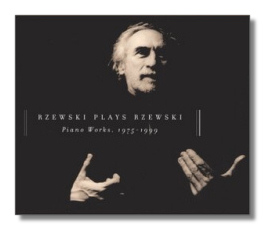
The Internet's Premier Classical Music Source
Related Links
- Latest Reviews
- More Reviews
-
By Composer
-
Collections
DVD & Blu-ray
Books
Concert Reviews
Articles/Interviews
Software
Audio
Search Amazon
Recommended Links
Site News
 CD Review
CD Review
Frederic Rzewski

Piano Works (1975-1999)
- North American Ballads for piano "Dreadful Moments"
- Which Side are you On?
- Down by the Riverside
- Winsboro Cotton Mill Blues
- The Housewife's Lament, Variations on a Theme
- Mayn Yingele (My Little Son) 24 Variations on a Tune
- A Life (dedicated to the memory of John Cage)
- Fougues (25)
- Fantasia
- Sonata
- The Road, a novel for solo piano, Miles 1-36
- 36 Variations on a Chilean Song "The People United Will Never Be Defeated"
- De Profundis, Melodramatic Oratorio for Solo Pianist Playing & Reciting
Frederic Rzewski, piano & voice
Nonesuch 79623 7CDs
Variations are at the heart of this oeuvre, comprising about three quarters of Frederic Rzewski's piano music from the period covered. Born 1938 in Massachusetts, he is a prolific American composer who has long lived in Belgium, where he is Professor of Composition at the Conservatoire Royal de Musique in Liège.
It has been an exhilarating journey to accompany this composer/pianist of complete individuality through a generous selection of his works.
Rzewski is as eclectic a musician as they come, having premièred Stockhausen's 10th Piano Piece, engaged with jazz and free improvisation groups, and always resisted musical compartmentalising; a man for the new millennium indeed. Some of his music is unashamedly tonal, often he makes you think of Ives, and his experiments with his instrument draw upon and extend the innovations of Cage. You are never sure what will come next.
As a pianist, Rzewski is comprehensively equipped, effortlessly virtuosic, favouring clarity with minimal pedal. Best known of Rzewski's works, and most often played, is Winsboro Cotton Mill Blues, the last of his North American Ballads, graphically representing horrifying and mind-numbing working conditions, which still exist! The scale and intensity of many of these works, in which political and social issues are never far behind the notes, demonstrate too his stamina, notably in the earliest here collected, the hour-long 36 Variations on Sergio Ortega's The People United Will Never Be Defeated. Rzewski and Ursula Oppens were together at a concert in 1974 where they heard the song and afterwards 'walked out into the street singing the melody, and it never left us from that time on'; both pianists have recorded Rzewski's variations, as too has Marc Hamelin.
If you are not party to the political background, you may find the tune as trite as Diabelli's little minuet; Rzewski's method is more elaboration than transformation, and the tune itself remains strongly present throughout. It grows on you, and you too will never forget it. More adventurousthan The People United Will Never Be Defeated, harmonically and pianistically, are several of the later works. Equally compelling, and more various, are the Variations on Mayn Yingele, the Yiddish complaint of a worker who works so long and hard that he never sees his baby boy at home except when he is asleep, 'a reflection on the vanished part of the Jewish tradition which so strongly colours, by its absence, the culture of our time'. His Sonata (1991) is a complex, dense structure, with a condensed recapitulation of its exposition, a second movement of twelve variations, 48 seconds each, and the last 27 variations on the famous medieval tune 'L'Homme Arme'.
Prolific in many genres, Rzewski's largest-scale work to date was a two-hour oratorio The Triumph of Death (1987-8), now capped in duration by the eight-hour collection of piano pieces, The Road. Those however he regards as music for home consumption, unconstrained by concert convention, to be savoured at will, in the tradition of Mendelssohn's Songs without Words and Bach's '48', neither envisaged for concert performance. However, it was a performance of the later books of The Road which made me eager to acquire this boxed set; here are the first four parts, Miles 1 to 32 of the entire 64, grouped into Turns, Tracks, Tramps and Stops, mostly brief, some of them introducing extraneous sound by voice or by exploiting creatively the percussive potentials of the inside and outside of the piano. One guesses that they were composed and developed at the keyboard, with improvisation playing a significant part in this eventual recorded version. His unsettling and moving setting of Oscar Wilde's letter from prison to Lord Alfred Douglas, 'De Profundis', composed for an uninhibited speaking virtuoso pianist, has been an influential contemporary contribution to the genre of melodrama (q.v. Strauss's Enoch Arden), with many interpretations "all original, interesting and different", by pianists "gay, straight, male and female".
It was serendipitous to have received this Rzewski box for review just after reviewing Uri Caine's amazing and mind-blowing double CD of Arrangements and Improvisations on the Diabelli Variations, a veritable recomposition of the Beethoven masterpiece, equally one not to be missed (Winter & Winter 910 086-2). Caine & Rzewski are composer pianists to be compared with the great and famous of earlier generations, and this box is as absorbing and thought provoking as the other.
The recordings (Brussels, 1999-2001) are first rate, the chosen Steinway D274 ideal for Rzewski's distinctive playing style. The presentation is elegant and lavish, the booklet cover illustrated with pages of the score scattered on Rzewski's piano. The composer's own notes are succinct and just what you need for a first hearing, with the Wilde letter (4 pages) given complete. Finally, there is an extensive essay 10 page essay (clear small print, black on white) by the important American composer, Christian Wolff. Recommended without reservation, and the remaining 'miles' of Rzewski's long Road are eagerly awaited.
Copyright © 2003, Peter G. Woolf




















